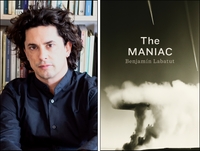When We Cease to Understand The World
Benjamín Labatut, trans. from the Spanish by Adrian Nathan West. New York Review Books, $18.95 trade paper (192p) ISBN 978-1-68137-566-3
Reading like an episodic digest, Chilean writer Labatut’s stylish English-language debut offers an embellished, heretical, and thoroughly engrossing account of the personalities and creative madness that gave rise to some of the 20th century’s greatest scientific discoveries. Labatut begins with Prussian blue, the first synthetic pigment, created by alchemist Johann Conrad Dippel, and links it to the evolution of modern industrial poisons and the life of WWI German chemist Fritz Haber. Labatut then follows Alexander Grothendieck, the reclusive French mathematician whose political and spiritual inclinations led him to a life of monklike sequestration, before dramatizing the long battle between Werner Heisenberg and Erwin Schrödinger over the future of quantum physics. Labatut, like his single-minded, sometimes nearly demented protagonists, is interested in the underlying nature of things; his subject is the all-consuming human drive to discover, and the danger therein, which he explores with literary but never pretentious prose, impressively translated by West (on Prussian blue: “something in the colour’s chemical structure invoked violence: a fault, a shadow, an existential stain passed down from those experiments in which the alchemist dismembered living animals to create it”). Hard to pin down and all the more enjoyable for it, this unique work is one to be savored. Agent: Constanza Martinez, Puentes Agency. (Sept.)
Details
Reviewed on: 06/22/2021
Genre: Fiction
Compact Disc - 979-8-228-03838-7
Compact Disc - 978-1-6665-2750-6
MP3 CD - 979-8-228-03840-0
MP3 CD - 978-1-6665-2782-7
Paperback - 978-89-546-8685-3


